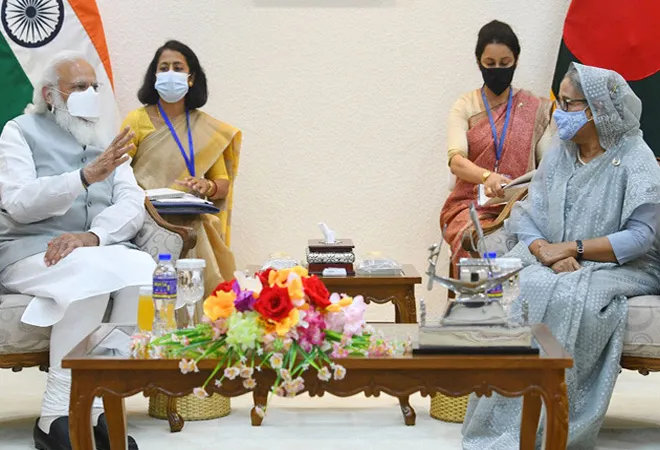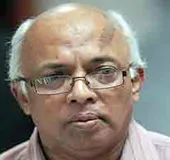
Islamist elements along with a group of anti-government students protesting the visit of Indian Prime Minister Narendra Modi to Bangladesh have certainly caused embarrassment for Prime Minister Sheikh Hasina. At Dhaka University, police had to resort to tough measures to contain the protests. Even tougher steps were taken in different cities against the radical Hefazat-e-Islam elements who were unhappy with the visit. A fair number of lives have been lost in the police shootings; a situation which has clearly left the political opposition in Dhaka trying to best maximise this situation. Also, there are fears that the space which once was occupied by the Jamaat-e-Islami — before its leading figures were tried for the 1971 war crimes and were marched to the gallows — could now be filled by the Hefazat. It remains for the government to shape strategy that will defuse the situation, given that it has for the last few years been accommodative to the Hefazat, much to the chagrin of secular forces in Bangladesh.
In a number of ways, the Modi–Hasina interaction in Dhaka rekindled, for an older generation, memories of the camaraderie between Sheikh Mujibur Rahman and Indira Gandhi in the early 1970s.
That said, Narendra Modi’s first visit to Bangladesh since 2015 has certainly been satisfying for the Indian leader and his delegation for a number of aspects. Modi was in his element during the entire visit, reiterating the close bonds India and Bangladesh have consistently had since the latter’s War of Liberation and the moral and material support provided by New Delhi to the Bangladeshi freedom struggle in 1971. In a number of ways, the Modi–Hasina interaction in Dhaka rekindled, for an older generation, memories of the camaraderie between Sheikh Mujibur Rahman and Indira Gandhi in the early 1970s.
For Bangladesh, it was only proper that the current Indian leader would be in Dhaka as the chief guest at the 50th anniversary celebrations of independence. Where Mrs Gandhi led a crusade, politically and diplomatically, in favour of Bangladesh half a century ago, Mr Modi held out the assurance that for all the stumbling blocks which have sometimes come in the way of a smooth Delhi–Dhaka relationship, the links between the two nations remain strong. The initialing of as many as five Memorandums of Understanding (MoUs) — in critical areas as health, energy, connectivity, and development cooperation — can seriously be looked upon as a deepening of bilateral relations. Add to that the launch of eight projects — the renovation of the Kuthibari in Shilaidaha, developing the Independence Road from Mujibnagar in Bangladesh to Kolkata by way of Nadia in West Bengal, erecting tombs in memory of Indian soldiers martyred in the 1971 War as part of the allied Indo-Bangladesh forces, the inauguration of passenger train services between Chilahati and Haldibari, the gift of 109 ambulances by Delhi to Dhaka, and the opening of two haats (rural markets) along the border between the two countries — undertaken by the two governments in the course of the Indian prime ministerial visit have been the highlights.
The fact that Dhaka’s diplomacy continues to be based on the principle of friendship for all and malice toward none, a formulation by Sheikh Mujibur Rahman in 1972 and maintained by successive governments in Bangladesh, is what underpins Dhaka’s approach to the world beyond its frontiers.
Overall, the Modi visit was a reassurance that while problems like sharing of the waters of the Teesta and incidents of killings along the border by India’s Border Security Force (BSF) continue to arouse passions among Bangladeshis; however, the larger truth is that the fundamentals of the relationship remains undisturbed. It is notable that in the past few years, Bangladesh’s foreign policy has taken on wider dimensions, especially in light of the country’s growing links with China. Delhi has, therefore, had its own misgivings about the Dhaka–Beijing links, given China’s focus on its Belt and Road Initiative (BRI) as well as its growing involvement in projects in Bangladesh. However, the fact that Dhaka’s diplomacy continues to be based on the principle of friendship for all and malice toward none, a formulation by Sheikh Mujibur Rahman in 1972 and maintained by successive governments in Bangladesh, is what underpins Dhaka’s approach to the world beyond its frontiers. Sheikh Hasina certainly reassured Narendra Modi on this score, stressing Bangladesh’s insistence on a pursuit of an independent foreign policy as it prepares to graduate from a low income country to a middle income nation. Additionally, Bangladesh expects India to adopt a more proactive approach to the Rohingya refugee crisis through increasing pressure on the Myanmar regime for a resolution of the problem.
The Indian Prime Minister’s visit to the tomb of Bangabandhu Sheikh Mujibur Rahman was a significant highlight of his Bangladesh trip. It was the very first time that a foreign head of government or state has been to Tungipara, the ancestral village where Bangladesh’s founder, assassinated in a coup in August 1975, lies buried. The Gandhi Peace Prize, posthumously awarded to Mujib, was an indication of the abiding respect in which the Indian government holds Bangladesh’s liberator. An important part of Modi’s Bangladesh trip was his visit to temples in Satkhira and Gopalganj, which clearly was reassuring for Bangladesh’s Hindu community. Questions were raised, though, over his interaction with the Matua community in Orakandi, Gopalganj, against the background of the state elections in West Bengal. With a good percentage of the Matua community being part of West Bengal’s population, eyebrows were raised as to whether the Indian leader, through such meetings, was not attempting to influence the vote in West Bengal. Indeed, Mamata Banerjee has already leveled such a charge against Modi. Where Bangladesh’s people are concerned, they are keeping a close watch on the campaign in West Bengal and are certainly keeping fingers crossed about the eventual outcome of the election.
Dhaka and Delhi have not disappointed each other.
The Indian Prime Minister’s visit to Bangladesh at a time when Bangladesh observes the 50th anniversary of the declaration of its independence in tandem with the half-century observance of Indo-Bangladesh relations and the centenary of the birth of Sheikh Mujibur Rahman has clearly reinforced ties between the two nations. The visit once again stressed a departure from a situation where people in Bangladesh loudly wondered in 2014 when the Bharatiya Janata Party stormed to power in India, if relations between a secular Awami League government in Dhaka and a Hindu nationalist government in Delhi would remain unaffected. Dhaka and Delhi have not disappointed each other. Sheikh Hasina and Narendra Modi, 50 years after 1971, preside over a continuity of circumstances which defined the links Indira Gandhi and Sheikh Mujibur Rahman forged between their two nations long ago. The Modi visit falls in the category of milestones which have regularly characterised diplomacy between India and Bangladesh. Trust remains the keyword.
The views expressed above belong to the author(s). ORF research and analyses now available on Telegram! Click here to access our curated content — blogs, longforms and interviews.




 PREV
PREV


